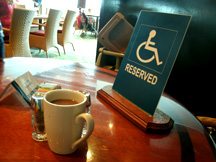March 27, 2013
 I was crippled by polio at six months old, paralyzed from the waist down on my left side. In order to stand or walk at all, I was fitted with a steel-and-leather brace from hip to shoe. This brace provided the external support I needed to stay upright and to walk. I was blessed to regain some use of my leg, and my muscles slowly grew stronger. I was able to go to a half brace; then, when I learned to lock my knee, they took away the brace altogether because the strength and support became internal rather than external.
I was crippled by polio at six months old, paralyzed from the waist down on my left side. In order to stand or walk at all, I was fitted with a steel-and-leather brace from hip to shoe. This brace provided the external support I needed to stay upright and to walk. I was blessed to regain some use of my leg, and my muscles slowly grew stronger. I was able to go to a half brace; then, when I learned to lock my knee, they took away the brace altogether because the strength and support became internal rather than external.
I am grateful for the way my brace gives me a picture of grace-filled accountability. One of the reasons God wants us to live in community is because sometimes we need an external support system that provides structure and support while we learn new ways of thinking and living. That external support system, a “spiritual exoskeleton,” can take many forms.
It’s friends who ask how they can pray for you and then follow up with shame-free, no-condemnation questions about how you’re doing.
It’s giving a trusted friend your car keys and debit card for safe keeping when you are struggling with the temptation to go off by yourself to indulge in destructive choices.
It’s knowing you need software to block your computer access to pornography, and asking someone else to choose the password.
It’s asking a friend to check up on you and ask how you’re doing at keeping a particular promise or fulfilling an obligation.
It’s inviting someone to text or call when you’re being tempted. Even at 2 a.m.
It’s being transparent, such as showing an accountability partner your bank records or cell phone records.
It’s the wisdom of AA and other recovery groups who strongly suggest that an addict seeking to become an overcomer attend ninety meetings in ninety days.
It’s discovering that seeking God through participating in a liturgical church’s daily worship and prayer services can produce the spiritual fruit of greater intimacy with Him.
It’s encouraging others in choices and habits that will help them grow spiritually, mentally, and emotionally. Asking, “What book(s) are you reading right now?” “What are you wrestling with or learning from God right now?” “What one thing would you like to be different a month (or three) from now, that I can pray for you about?” It’s living out the truth of Proverbs 27:17, “As iron sharpens iron, so one person sharpens another.”
All these means of external support can become the beauty of internal strength as we “grow up into Christ, who is the head. From him the whole body grows, fitted and held together through every supporting ligament. As each one does its part, the body grows in love” (Eph. 4:15-16). The “spiritual exoskeleton” can become the internal “supporting ligament,” not to mention core strength, of self-controlled people.
Here’s to being able to take off the braces of our lives—but first, we give thanks for them!
This blog post originally appeared at blogs.bible.org/tapestry/sue_bohlin/spiritual_exoskeleton










